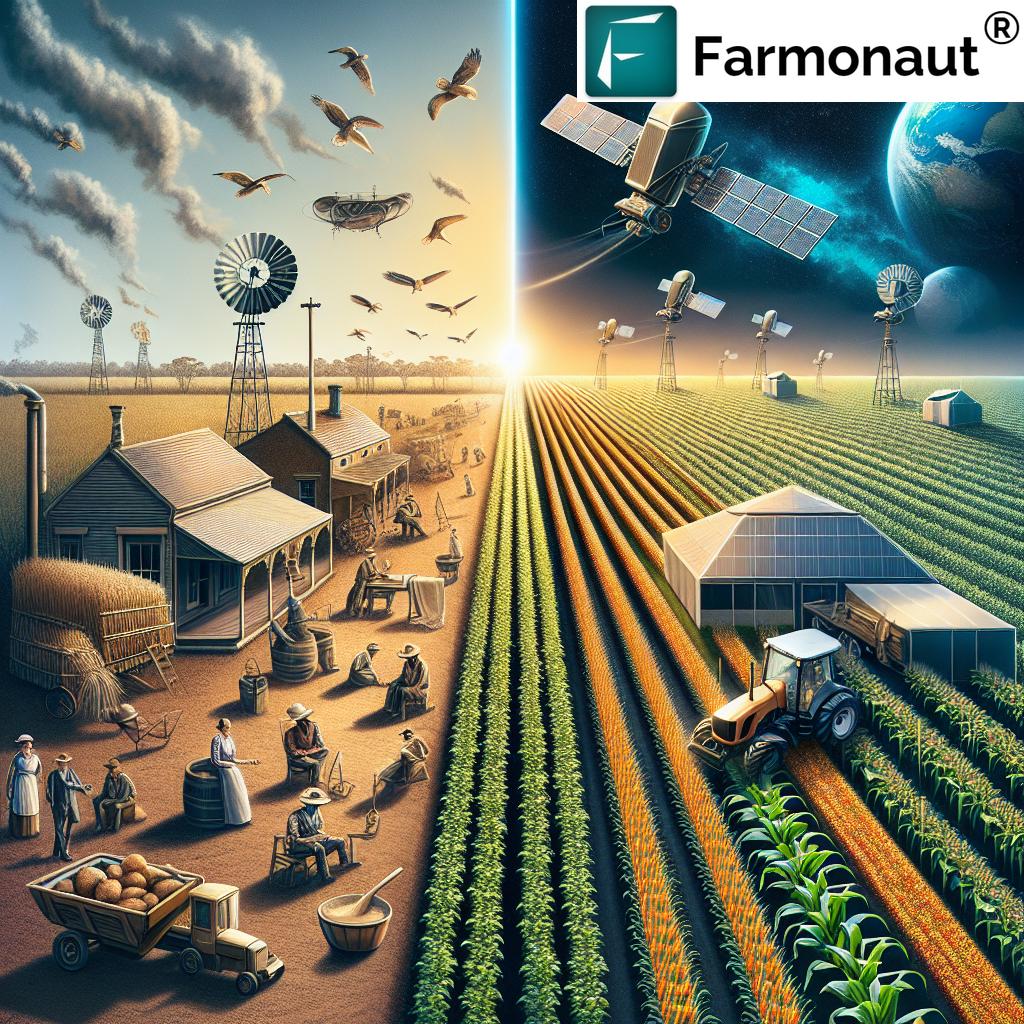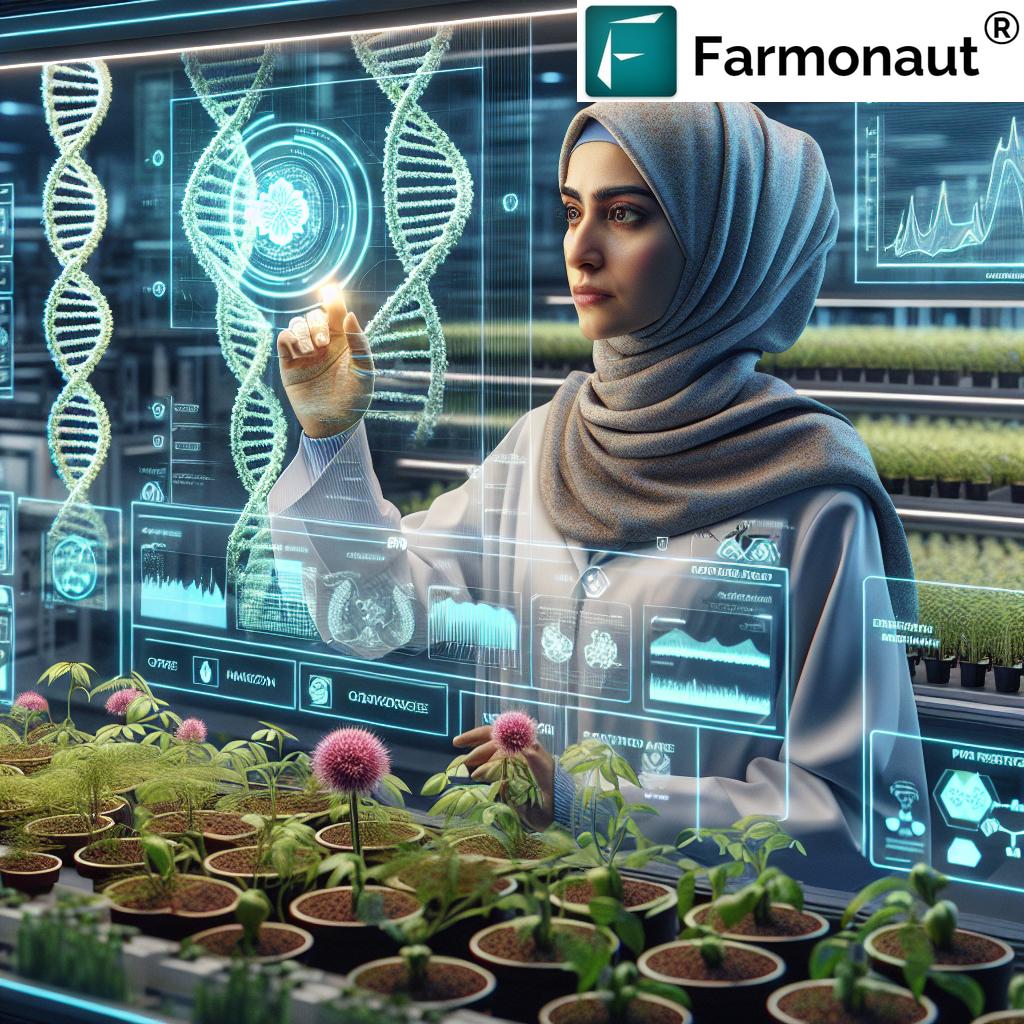Revolutionizing Australian Agriculture: How Farmonaut’s Plant Biotechnology Innovations Boost Crop Yields and Sustainability

“Plant biotechnology has enabled the development of over 300 pest-resistant crop varieties, reducing pesticide use by up to 37%.”
In the vast expanse of Australia’s agricultural landscape, a revolution is quietly unfolding. Plant biotechnology, coupled with sustainable agriculture practices, is transforming the way we approach crop science and food security solutions. At Farmonaut, we’re at the forefront of this revolution, harnessing the power of satellite technology and precision agriculture to complement these groundbreaking innovations.
As we delve into the world of agricultural biotechnology, we’ll explore how these advancements are addressing the global challenges of increasing food production while simultaneously reducing environmental impact. From crop yield optimization to the development of climate-resilient crops, we’re witnessing a paradigm shift in farming that promises to meet the growing demand for food with limited arable land.
The Evolution of Plant Biotechnology in Australian Agriculture
Australia, with its unique climate challenges and vast agricultural areas, has been a pioneer in adopting and developing plant biotechnology innovations. The evolution of these technologies has been nothing short of remarkable, transforming the face of Australian agriculture over the past few decades.
- Early Adoption: Australian farmers were among the first to embrace genetically modified (GM) crops, particularly in cotton production.
- Regulatory Framework: The establishment of the Office of the Gene Technology Regulator in 2000 provided a solid foundation for responsible biotechnology development.
- Research Focus: Australian research institutions have been at the forefront of developing drought-tolerant and pest-resistant crop varieties tailored to local conditions.
This evolution has set the stage for a new era in agriculture, where science and technology work hand in hand with traditional farming practices to create more resilient and productive agricultural systems.
Crop Yield Optimization: The Heart of Agricultural Innovation
At the core of plant biotechnology’s impact on Australian agriculture is its ability to optimize crop yields. This is not just about producing more; it’s about producing more efficiently and sustainably.
Key aspects of crop yield optimization include:
- Genetic Modification: Enhancing crops to resist pests, diseases, and environmental stresses.
- Precision Breeding: Using advanced techniques to select for desirable traits more accurately and rapidly than traditional breeding methods.
- Nutrient Use Efficiency: Developing crops that can better utilize available nutrients, reducing the need for excessive fertilizer application.
At Farmonaut, we complement these biotechnological advancements with our satellite-based crop health monitoring system. By providing real-time data on vegetation health (NDVI) and soil moisture levels, we enable farmers to make informed decisions that further enhance the benefits of biotech crops.
Climate-Resilient Crops: Adapting to Australia’s Harsh Conditions
Australia’s climate, characterized by frequent droughts and extreme temperatures, poses significant challenges to agriculture. Plant biotechnology has risen to this challenge by developing climate-resilient crops that can thrive in these harsh conditions.
Examples of climate-resilient crop developments include:
- Drought-Tolerant Wheat: Varieties that can maintain yield under water-stressed conditions.
- Heat-Resistant Barley: Crops that can withstand higher temperatures during critical growth stages.
- Salt-Tolerant Rice: Varieties adapted to grow in saline soils, expanding potential cultivation areas.
These innovations are crucial in the face of climate change, ensuring food security and maintaining Australia’s position as a major agricultural exporter. Our Jeevn AI Advisory System at Farmonaut complements these efforts by providing personalized farm advice based on real-time weather forecasts and crop conditions, helping farmers make the most of these resilient crop varieties.
Pest-Resistant Crop Varieties: A Sustainable Approach to Crop Protection
Pest management has long been a significant challenge in agriculture, often requiring extensive use of chemical pesticides. Plant biotechnology has revolutionized this aspect of farming by developing pest-resistant crop varieties.
Benefits of pest-resistant crops:
- Reduced reliance on chemical pesticides
- Lower environmental impact
- Improved crop yields and quality
- Cost savings for farmers
In Australia, pest-resistant cotton has been particularly successful, dramatically reducing the need for insecticide applications. This not only benefits the environment but also improves the economic viability of cotton farming.
Farmonaut’s satellite-based monitoring can detect early signs of pest infestations, allowing for targeted interventions and maximizing the effectiveness of pest-resistant varieties.
“Biotech crops have increased global farm income by $225 billion and reduced CO2 emissions equivalent to removing 15.3 million cars from roads.”
Agricultural Stewardship Programs: Balancing Innovation and Responsibility
With great innovation comes great responsibility. Agricultural stewardship programs play a crucial role in ensuring that the benefits of plant biotechnology are realized while minimizing potential risks.
Key elements of agricultural stewardship in Australia include:
- Integrated Pest Management (IPM): Combining biotech solutions with ecological approaches to pest control.
- Resistance Management: Strategies to prevent the development of resistant pests and weeds.
- Coexistence Practices: Ensuring biotech crops can be grown alongside conventional and organic crops without conflict.
These programs are essential for maintaining the long-term effectiveness of biotechnology innovations and preserving the biodiversity of agricultural ecosystems. Farmonaut supports these efforts through our blockchain-based traceability solutions, which enhance transparency and accountability in the agricultural supply chain.
Enhancing Nutritional Profiles: Beyond Yield and Resistance
Plant biotechnology isn’t just about producing more food; it’s also about producing better food. Biofortification, the process of enhancing the nutritional content of crops through breeding or genetic modification, is a promising frontier in agricultural biotechnology.
Examples of nutritionally enhanced crops in development or use in Australia:
- High-Amylose Wheat: Contains more resistant starch, beneficial for gut health and managing diabetes.
- Omega-3 Canola: Produces long-chain omega-3 fatty acids, typically found in fish oil.
- Golden Rice: While not commercially grown in Australia, this vitamin A-enriched rice showcases the potential of biofortification.
These innovations have the potential to address nutritional deficiencies and improve public health outcomes, particularly in regions where dietary diversity is limited.
Explore Farmonaut’s API for advanced agricultural insights
Safeguards and Regulations: Ensuring Health and Safety
The development and deployment of plant biotechnology innovations are subject to rigorous safeguards and regulations to ensure the health and safety of consumers and the environment.
Key aspects of Australia’s regulatory framework include:
- Gene Technology Act 2000: Provides a national scheme for regulating genetically modified organisms.
- Food Standards Australia New Zealand (FSANZ): Assesses the safety of GM foods before they can be sold.
- Australian Pesticides and Veterinary Medicines Authority (APVMA): Regulates agricultural chemicals, including those used in conjunction with biotech crops.
These regulations ensure that plant biotechnology innovations undergo thorough safety assessments before reaching the market. At Farmonaut, we support regulatory compliance by providing accurate data on crop management practices through our satellite monitoring and AI advisory systems.

The Role of Precision Agriculture in Complementing Biotechnology
While plant biotechnology provides the genetic foundation for improved crops, precision agriculture ensures that these innovations are utilized to their full potential in the field. This is where Farmonaut’s expertise in remote sensing and GIS technology comes into play.
Key ways precision agriculture complements plant biotechnology:
- Targeted Resource Application: Using satellite data to apply water, fertilizers, and pesticides only where and when needed.
- Crop Monitoring: Real-time tracking of crop health to maximize the benefits of biotech traits.
- Data-Driven Decision Making: Utilizing AI and machine learning to optimize farm management practices.
By combining the power of biotechnology with the precision of satellite-based monitoring, we’re enabling Australian farmers to achieve unprecedented levels of efficiency and sustainability.
Access Farmonaut’s API Developer Docs for integrating advanced agricultural data
The Future of Food Production: Balancing Innovation and Sustainability
As we look to the future, the integration of plant biotechnology and precision agriculture holds immense promise for addressing global food security challenges while minimizing environmental impact.
Key areas of future development include:
- Carbon Sequestration: Developing crops that can more effectively capture and store carbon in the soil.
- Water Use Efficiency: Creating varieties that require less water, crucial in drought-prone regions of Australia.
- Nutrient Cycling: Enhancing crops’ ability to recycle nutrients, reducing the need for synthetic fertilizers.
At Farmonaut, we’re committed to supporting these advancements through our innovative satellite-based solutions. Our carbon footprinting tools, for instance, help agribusinesses monitor and reduce their environmental impact, aligning with the goals of sustainable agricultural development.
Addressing Challenges and Misconceptions
Despite the numerous benefits of plant biotechnology, challenges and misconceptions persist. It’s crucial to address these openly and transparently.
Common concerns and responses:
- Environmental Impact: Biotech crops are extensively tested for environmental safety and often reduce the need for harmful pesticides.
- Food Safety: GM foods undergo rigorous safety assessments and are considered safe by scientific consensus.
- Biodiversity: Biotechnology can actually contribute to biodiversity by reducing land use pressure and preserving native habitats.
Education and transparent communication are key to addressing these concerns. Farmonaut’s commitment to data transparency and traceability supports this goal by providing verifiable information on agricultural practices and outcomes.
The Impact of Plant Biotechnology on Australian Agriculture: A Comparative Analysis
| Biotechnology Innovation | Crop Yield Increase (%) | Environmental Impact Reduction (%) | Key Benefits |
|---|---|---|---|
| Drought-Resistant Wheat | 15-25% | 20-30% water usage | Improved resilience to water stress, consistent yields in dry conditions |
| Pest-Resistant Cotton | 10-20% | 50-60% pesticide use | Reduced chemical inputs, lower production costs, improved fiber quality |
| Nutrient-Enhanced Canola | 5-10% | 15-25% fertilizer use | Higher omega-3 content, improved soil health, reduced nutrient runoff |
| Glyphosate-Tolerant Crops | 10-15% | 30-40% herbicide use | Simplified weed management, reduced soil erosion, conservation tillage |
Conclusion: A Sustainable Future for Australian Agriculture
The integration of plant biotechnology innovations with sustainable agriculture practices is reshaping the landscape of Australian farming. From enhancing crop yields and resilience to minimizing environmental impact, these advancements are crucial in addressing the challenges of food security and climate change.
At Farmonaut, we’re proud to be part of this agricultural revolution. Our satellite-based farm management solutions complement biotechnology innovations, providing farmers with the tools they need to maximize the benefits of these advancements. By combining cutting-edge science with precision agriculture, we’re helping to create a more sustainable, productive, and resilient agricultural sector in Australia and beyond.
As we continue to innovate and adapt, the future of Australian agriculture looks bright. With responsible stewardship, ongoing research, and the integration of technologies like those offered by Farmonaut, we can ensure that our agricultural practices not only feed the growing population but also protect and nurture the environment for generations to come.
Frequently Asked Questions
- What is plant biotechnology?
Plant biotechnology is the use of genetic engineering techniques to modify plants for improved traits such as increased yield, pest resistance, or enhanced nutritional content. - Are genetically modified crops safe for consumption?
Yes, GM crops undergo rigorous safety assessments and are considered safe by scientific consensus and regulatory bodies worldwide. - How does plant biotechnology contribute to sustainability?
It helps reduce pesticide use, improve water efficiency, and increase yields on existing farmland, reducing pressure on natural habitats. - What role does Farmonaut play in supporting plant biotechnology?
Farmonaut provides satellite-based monitoring and AI advisory systems that help farmers optimize the use of biotech crops and implement sustainable farming practices. - Can biotechnology help address climate change in agriculture?
Yes, by developing climate-resilient crops and improving carbon sequestration in agricultural soils, biotechnology can play a significant role in mitigating and adapting to climate change.
















